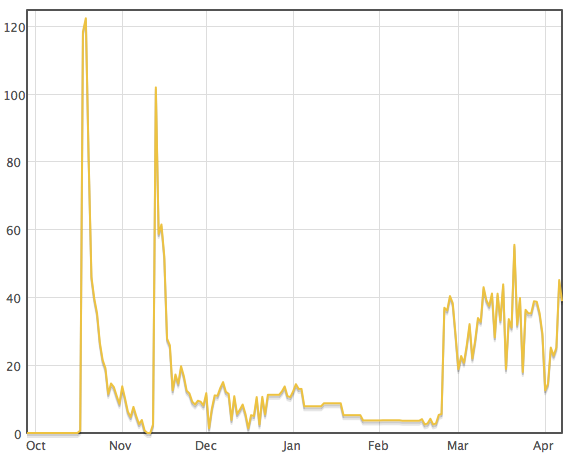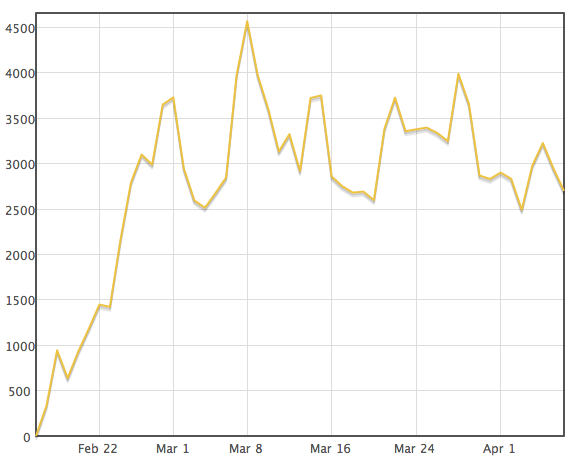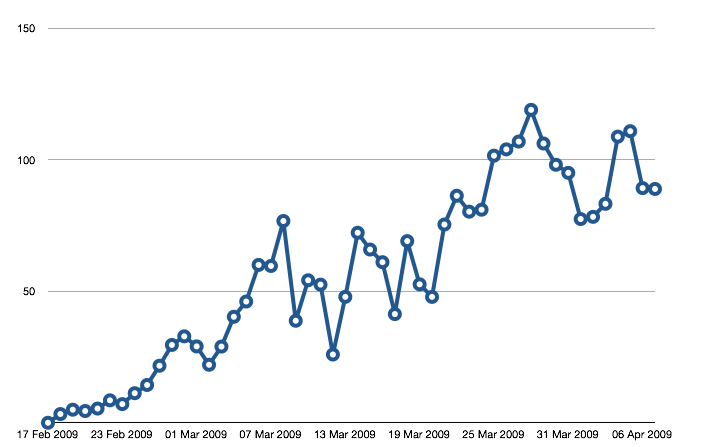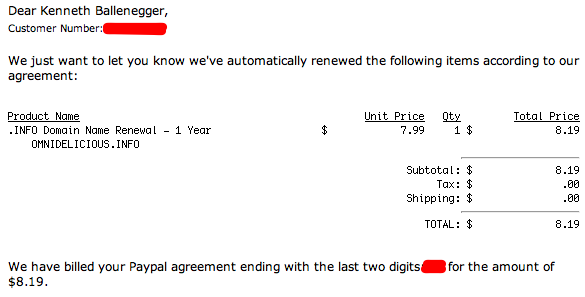My name is Kenneth and I write cool Mac and iPhone software. This is my personal weblog where I post about stuff I find interesting. I usually write about Mac development, the business of shareware and the Mac community in general.
read more →Dear Mr. Gruber,
I have read your recent article entitled How to Block the DiggBar in which you argue that the the DiggBar is fundamentally evil. You then go on to show how you go out of your way to block traffic coming from a shortened Digg URL.
I’m all for calling out jackassery on the internet and am an avid reader of your RSS feed, in which you usually do a pretty good job of that. In fact, Daring Fireball is, according to NetNewsWire the feed I give most attention to. However, this specific article perturbs me in a number of ways.
Firstly, regarding the topic of the DiggBar itself, I disagree with you in that the DiggBar is the possibly very best possible implementation of that specific feature. I’ll be the first to agree with you that framing the content is not an ideal solution, but I fail to see a better one.
The DiggBar may have its fair share of flaws. It may or may not attribute to Digg some of the search engine ‘juice’ that is rightfully the publisher’s. However, it is important to note that Digg has denied this claim, and I, for one, believe them until proven wrong. It is also important to note that if it weren’t for Digg, the publisher wouldn’t receive the search engine ‘juice’ — or the traffic for that matter — in the first place.
I personally think they have done a pretty good job using the available technologies. The fact is that the DiggBar is primarily a tool for Digg users, and that for that purpose it is a very useful and both well-designed and well-engineered tool.
The second thing that troubles me about your article is how you go out of your way block Digg traffic, and by sharing the know-how encourage others to do so too.
This will certainly not be of any benefit to the publishers. In fact, it will most likely destroy any chance of them becoming popular on Digg. While I agree with you that average Digg users are of incontestably lower average quality than your average reader, it is widely agreed that just like any publicity is good publicity, any traffic is good traffic.
One definitely does not lose anything by letting Digg users use the DiggBar on one’s site. Blocking the DiggBar will only have two effects: to turn free traffic to one’s site into no traffic at all; and to ruin the experience of Digg user’s who’d like to use one of the site’s most attractive features in conjunction with one’s site.
Lastly, I also have a gripe with the tone of your article. I find it to be misleading in that it gives your opinion — a negative portrayal of Digg — and passes it off as fact. Your description of the DiggBar, for example, does not actually fully describe the DiggBar, but rather enumerates several negative facts concerning it. This immediately gives the reader a fully negative view of the DiggBar that it perhaps doesn’t deserve.
Yours sincerely,
Kenneth Ballenegger
Growing iPhone Development Into A Viable Business
When one hears stories from iPhone developers, they’re either from the lucky ones who made insane amounts of money and laugh all the way to the bank, or rather from disappointed developers who consider their efforts a failure.
The latter tend to blame the App Store for the failure of their application(s). Granted, the App Store is a harsh market which has both its advantages and its flaws. But, in my humble opinion, a good craftsman never blames his tools.
The App Store has trends that can be analyzed, and if you’re going to be developing for the iPhone, you need to learn how to adapt. I have learnt this first-hand through experimentation, and have learnt many valuable lessons along the way.
Last September, while working on a much bigger iPhone game, I thought it would be cool to create a quick one-trick application for viewing jokes. I never envisioned that iLaugh would become my most lucrative app that would keep me going while I develop the aforementioned game.

The Y-Axis shows daily revenue in US dollars.
Let’s leave the end of the graph (Feb-Apr) aside for a minute, we’ll get back to it.
You can see the initial release spikes, typical of the App Store, and then a very depressing downwards trend right after release. For the second release, 1.1, I upped the price from $0.99 to $1.99. Which slightly lowered the initial spike revenue. But at that stage, I had a much more mature app which unfortunately, due to lack of effective marketing stagnated at a sub-$20 daily revenue.
But in February, I made pretty much the best decision I have ever made. That, of course, was to release a Lite version. I initially thought it would be a nearly cost-free way to get some free advertising for the premium version. The main reason I put ads inside the Lite version was actually not to create revenue, but rather to give users a reason to upgrade. But, other than that, the Lite version was an identical, fully functional copy of the premium version.
As you can see, it did a pretty decent job of advertising the premium version. Since the mid-Feb release of iLaugh Lite, daily revenue for iLaugh has been much higher than it previously was.
Fortunately, iLaugh Lite became quite popular on the iTunes App Store, and while never entering the global top 100, it has charted as high as #29 on the Entertainment chart, and has been in the top 40 entertainment apps nearly since its release.
While this did have some unexpected consequences, like bringing my entire server down due to excessive traffic which brought the iLaugh service down and forced me to upgrade to a better server, the benefits were pretty clear.

This graph shows daily iLaugh Lite downloads.
This equates to about 100,000 monthly downloads.
Here’s a graph that shows the web-service traffic this generates (since each joke is fetched from my server, this gives me a pretty good overview of the actual usage of the app). Unfortunately, I only started using this particular analytics package on March 2nd, so that’s when the graph starts.

To date, iLaugh has served over 6 million jokes, and it’s going at about one million per week.
So far I left out one pretty important thing: ad revenue. But one always leaves the best for last, right? So here goes:

As the installed user-base for iLaugh Lite grows, so does daily ad revenue. Currently, I’m seeing pretty good numbers. I have around 6 million monthly ad impressions, and as you can see in the above graph, I’m seeing around $100 daily ad revenue.
While these aren’t mind-shattering numbers, I think they give a pretty good overview of what one can achieve as an average developer for the iPhone platform.
Best of iLaugh
Here are a few jokes I picked out as winners from the contest:
Warning: some of these jokes may be rated R
The nun teaching Sunday school was speaking to her class one morning when she asked the question, ‘When you die and go to heaven…which part of your body goes first?’
Suzy raised her hand and said, ‘I think it’s your hands’.
‘Why do you think it’s your hands, Suzy?’
Suzy replied, ‘Because when you pray, you hold your hands together in front of you and God just takes your hands first’.
‘What a wonderful answer!’ the nun said.
Little Johnny raised his hand and said, ‘Sister, I think it’s your feet’.
The nun looked at him with the strangest look on her face. ‘Now, Little Johnny, why do you think it would be your feet?’
Little Johnny said, ‘Well, I walked into Mommy and Daddy’s bedroom the other night, Mommy had her legs straight up in the air and she was saying, ‘Oh! God, I’m coming! … and if Dad hadn’t pinned her down, we’d have lost her’.
The Nun fainted
Did you hear about the guy whose whole left side was cut off? He’s all right now.
“Dairy farming s’a rough life”, one young man lamented, “what with my two brothers and me having to divvy up the milking of two hundred cows each morning.”
“Wow, that does sound exhausting” remarked one onlooker.
“Yea, well, it’ll be better soon when my pa gets another hundred head.”
“How can it be better with more cows to milk?”
“Well, shoot! Any fool can divide 300 by 3.”
At the exact same time there are two young men on opposite sides of the Earth. One is walking a tight rope between two skyscrapers. The other is receiving oral sex from a 98 year old woman. They are both thinking the exact same thing:
Don’t Look Down!
Q: Why do men like women dressed in leather?
A: They smell like new car.
Your mom is so fat that when she fell in love, she broke it.
Your mom is so fat that when she tried to sit up, she rocked herself to sleep.
An infinite number of mathmaticians walk into a bar. The first mathmatician says to the bartendender, “I’d like a beer, please.” The second mathmatician says, “I would like a half a beer, please, sir.” The third mathmatician, smiling, says, “I’d like half of a half of a beer, please, good sir!” The bartender, glancing down the line, says, “You’re all morons!”, pours two beers and walks away.
A priest and a rabbi are at a wedding. They see a kid bending over to tie his shoe. So the priest goes to the rabbi: “Oh man, I’d really love to screw that kid”. The rabbi says: “Out of what?”
A priest offered a Nun a lift.
She got in and crossed her legs, forcing her gown to reveal a leg.
The priest nearly had an accident.
After controlling the car, he stealthily slid his hand up her leg.
The nun said, ‘Father, remember Psalm 129?’
The priest removed his hand. But, changing gears, he let his hand slide up her leg again
The nun once again said, ‘Father, remember Psalm 129?’
The priest apologized ‘Sorry sister but the flesh is weak.’
Arriving at the convent, the nun sighed heavily and went on her way.
On his arrival at the church, the priest rushed to look up Psalm 129. It said, ‘Go forth and seek, further up, you will find glory.’
Moral of the story:
If you are not well informed in your job, you might miss a great opportunity.
A man is getting into the shower just as his wife is finishing up her shower, when the doorbell rings.
The wife quickly wraps herself in a towel and runs downstairs.
When she opens the door, there stands Bob , the next-door neighbor.
Before she says a word, Bob says, ‘I’ll give you $800 to drop that towel.’
After thinking for a moment, the woman drops her towel and stands naked in front of Bob , after a few seconds, Bob hands her $800 and leaves.
The woman wraps back up in the towel and goes back upstairs.
When she gets to the bathroom, her husband asks, ‘Who was that?’
‘It was Bob the next door neighbor,’ she replies.
‘Great,’ the husband says, ‘did he say anything about the $800 he owes me?’
Moral of the story:
If you share critical information pertaining to credit and risk with your shareholders in time, you may be in a position to prevent avoidable exposure.
GoDaddy are RATS.
This is not actually the best choice of words, but I decided a while ago not to use profanity on my blog. Therefore, I’m going to get around that by posting a quote from my twitter stream:
GoDaddy is the corporate equivalent of a MOTHERFUCKING CUNT! No, Seriously!
And I totally mean that.
Today, they charged me close to $10 for the renewal of a domain I bought last year for one or two dollars for the purpose of setting up a site as a first of april prank.
Please note that I never agreed to renew the domain, and that with my usual registrar, I can drop domains just by letting them expire. Also, when I bought the domain with GoDaddy, I specifically used PayPal and chose the option to do a one-time payment, and not letting GoDaddy automatically charge me for anything, but it looks like that setting got ignored.
I already knew GoDaddy was evil, since they tried to upsell me tons of things when all I wanted to do was get a cheap domain, but now I know they actually steal people’s money.

How Genius is a Genius Business Model
Apple’s introduction of Genius into iTunes may have been one of the best business decisions they ever made.
First, it’s a great feature for the user. It’s a joy to just chose a beloved track, and instantly get plenty more of that awesomeness. I’ve been a great fan of Genius myself, and I use it all the time. It’s also great when picking out tracks for a DJ set.
But what probably goes unnoticed by the general public is the staggering amounts of money Apple will be able to make of this. They will own the data to what millions of people are listening to. They’ll have direct access to millions of people’s tastes, likes, dislikes. Many companies would kill for such data, and I wouldn’t be surprised if the labels were prepared to pay big for such statistics.
Additionally, Apple is using genius to sell more music on the iTunes Store through the sidebar. The iTunes Store is already the biggest music retailer in the US, but with Genius, it’ll only sell even more music to the people already buying music on the store.
And lastly, Apple could sell promotions for artists who want more exposure for their music. Since Apple controls what users are exposed to / listen to when they’re in Genius, they can now push an artist more often in their user’s Genius lists, and thus give the user the impression and the feeling of liking the music. They can thus manipulate the user’s tastes, and I’m willing to bet that many record labels would pay big money for that kind of exposure.